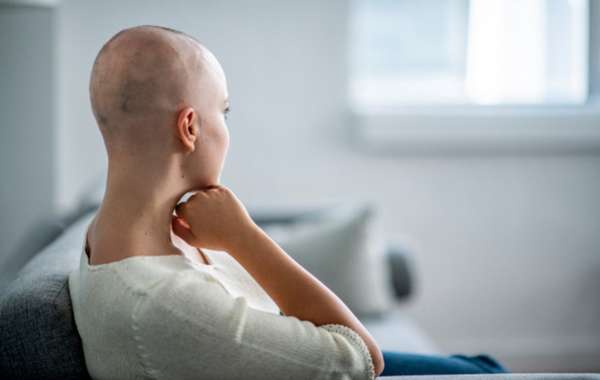For the majority of disease patients, managing hair loss can be one of the most upsetting symptoms of treatment. The emotional trauma of witnessing hair clumps falling out can have a negative impact on self-esteem and body image. While balding is often brief during chemotherapy or radiation, it's still an incredibly troublesome encounter that patients need direction on making due. Concerning cancer and hair loss, here are four essential questions to ask your oncologist:
What causes hair loss with my specific treatment plan?
- Not all cancer treatments cause hair loss, and the likelihood varies based on the drugs, dosages, and treatment areas involved. It's important to understand the mechanisms underlying potential hair loss in your situation.
- Chemotherapy targets all rapidly dividing cells, good and bad. The hair follicles, especially on the scalp, contain some of the fastest-growing cells, which are affected during cell division phases when chemo disrupts their growth patterns. This stunts the follicle's cycle, causing hair roots to fall out prematurely.
- Radiation therapy can permanently damage hair follicle cells and stem cells in areas where high-energy beams are aimed directly, such as the brain or breast/chest areas. Hair may grow back after these cells recover from lower radiation doses.
- Diffuse hair loss can happen as a side effect of some hormone therapies and targeted drug treatments like EGFR inhibitors because they mess up the pathways that control hair growth.
- Understanding the root cause of your personal risk of alopecia can help you mentally prepare and more effectively prevent or manage it.
What is the likelihood, timing, and pattern of hair loss?
- The chances, onset timeline, and patterns of alopecia can vary based on the specific chemotherapy regimen, radiation field, dosages, and combinations used in your treatment protocol.
- Certain chemotherapy drugs like doxorubicin, cyclophosphamide, and paclitaxel carry a hair loss risk of over 50%. But other drugs like vincristine, methotrexate, or cytarabine have lower tendencies for alopecia.
- Hair loss usually begins 2-4 weeks after starting chemotherapy once the follicles enter their resting phase and shed old hairs. It often progresses as a gradual thinning, diffused pattern over the scalp.
- With radiation, hair loss is typically localized to the treated area. Higher radiation doses can cause permanent hair loss, while lower doses may allow regrowth over time.
- Finding out more about your own gambling elements, timetables and expected examples can assist with setting practical assumptions and making proactive preventive strides.
How could I prevent hair loss?
As the best ayurvedic cancer hospital in India, we suggest preventive measures through which some cases of hair loss cannot be avoided, there are a few methods that may assist in its reduction and management:
- Scalp Cooling (Cold Covers): Tightening veins with cold temperatures can decrease chemo drug openness and harm hair follicles. Your doctor may recommend cold air or gel-filled caps worn before, during and after infusions.
- Scalp Massage: Gentle massage may temporarily increase blood flow and loosen shed hairs before they fall out in bulk.
- Minoxidil: This effective arrangement is now and again endorsed to dial back or limit hair diminishing by dragging out the anagen development stage.
- Hair Covers: Your oncologist might advise wearing hair covers like turbans, scarves, hairpieces, cooling covers, or cold covers pre-chemotherapy to safeguard weak hair follicles.
- Anti-nausea Medication: Some anti-sickness drugs, like arm fractures, can affect hair growth as a side effect. Discuss alternatives.
- Diet: Proper nutrition with protein, iron, zinc, vitamins, and antioxidants may potentially aid in hair regrowth post-treatment.
What are the options after hair loss for regrowth and covering?
It's essential to discuss expectations for hair regrowth timelines and patterns after treatment ends. It typically begins with soft, baby-fine hair regrowth 3–6 months post-chemo. Radiation-induced permanent hair loss may require exploring hairpieces or wigs.
Many patients opt for temporary coverings, even with eventual regrowth expected. Cold caps, wigs, scarves, turbans, and hats are common choices. Your care team can provide guidance on getting fitted for wigs, styling tips, wig banks, and any insurance coverage options available.
It's also advisable to ask about medications that may help accelerate regrowth, like minoxidil or nutritional supplements. Counseling support and connecting with other survivors can provide valuable psychological coping mechanisms.
Hair is deeply personal, and hair loss can shake one's core identity as a cancer patient. By proactively discussing concerns with a compassionate oncology team, patients can feel more in control and better equipped with practical tools and emotional reassurance to navigate this difficult transition with greater confidence.
Conclusion:
All in all, examining disease and going bald can be a touchy point, yet it's a significant one for the majority of cancer patients. By zeroing in on these four key inquiries, you can more readily comprehend what's in store and how to explore this difficult experience. Make sure to get some information about the particular reason for going bald, the normal course of events for regrowth, accessible choices for overseeing going bald, and steady assets.
Most importantly, realize that you are in good company. As the best cancer hospital in Bangalore, we understand that numerous cancer patients face this journey, and there are various emotionally supportive networks and answers to help you through it. Remember that going bald doesn't characterize you; it's a brief piece of your disease process. Embrace the help of your friends and family, track down solace in your special story, and realize that you have the solidarity to confront whatever comes your way.




